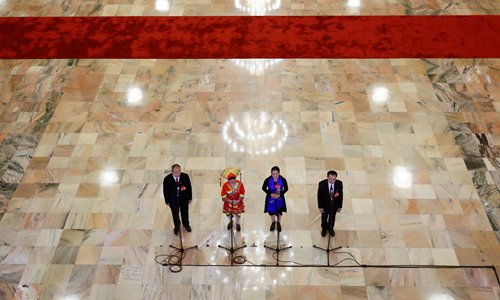
File Photo: VCG
Xi Jinping, general secretary of the Communist Party of China (CPC) Central Committee, on Thursday renewed his call for perseverance with the anti-graft drive.
Xi said at a discussion session with Guizhou delegates on the second day of the 19th CPC National Congress that on the issue of comprehensively strengthening Party discipline, one cannot have the idea of ending on a high note. He urged the Party to make the drive more scientific and efficient.
At a separate press conference on Thursday, Yang Xiaodu, vice secretary of the CPC Central Commission for Discipline Inspection (CCDI) and minister of the National Bureau of Corruption Prevention, said some 440 Party leaders have been investigated since 2012.
The 440 included leaders at or above the provincial or army commander level and other leading Party officials under Party Central Committee management, Yang said.
Of them, 43 were members or alternate members of the 18th CPC Central Committee and nine were members of the CCDI, he said.
"By 'taking out tigers' and 'swatting flies,' we have built and consolidated an overwhelming momentum in the fight against corruption," Yang said.
Yang outlined the achievements in exercising strict self-governance since the 18th CPC National Congress.
"Discipline inspection commissions and supervision agencies across the country dealt with 2.674 million leads on discipline violations, filed 1.545 million cases, punished 1.537 million Party members and transferred 58,000 suspects to judicial bodies," he said.
The CCDI would focus on removing corrupt senior officials in key economic and political positions that have not disciplined themselves after the 18th CPC National Congress, Yang said.
"We will continue to see that in fighting corruption, there are no no-go zones, no stone is left unturned and no tolerance is shown. We will maintain a tough stance, a long-term deterrence and resolutely punish corruption."
Yang emphasized the necessity of strengthening intraparty oversight, developing a sound Party and State oversight system and deepening reform of the national supervision system in line with the Central Committee's plan.
Su Wei, a professor at the Party School of the CPC Chongqing Committee, told the Global Times that institutionalization of the campaign was needed for "Party construction and to cement the achievements."
Chinese legislators have revised the law on administrative supervision to turn it into a national supervision law this year, the Xinhua News Agency reported.
The move will provide a legal guarantee for efforts to put in place a centralized, unified, authoritative and highly efficient national supervision system, according to a report of the National People's Congress (NPC) Standing Committee.
The CCDI will work with a new supervision committee under the leadership of the Party committee, Yang noted. The committee represents a merger of intra-Party supervision with discipline and national supervision as well as running the Party through regulations and ruling the country by law.
Responding to a question on anti-graft efforts and human rights, Yang said that the drive protected the interests of the Chinese people and decreased human rights violations caused by the abuse of power.
Improved evaluation
More than 40,000 officials have been removed from their part-time job positions in enterprises and 35,000 officials have been regulated "for inappropriately applying for and holding private documentation needed to leave the Chinese mainland," said Qi Yu, vice minister of the Organization Department of the CPC Central Committee, at the press conference on Thursday.
Aside from resolutely punishing corruption, the CPC will strengthen political and theoretical education of Party members, improve Party self-governance and implement a more strict process for selecting and promoting officials.
"We have carefully implemented the standard for good officials under the new circumstances … improving the system for assessing and evaluating the performance of officials," Qi said.
By extending strict self-governance of the Party towards grass-roots Party organizations, Qi explained that the vigor and vitality of grass-roots Party organizations and Party members have been greatly enhanced.
To respond to concerns about whether the CPC's efforts building Party organizations in enterprises, especially overseas-funded ones in China would interfere with their business, Qi said the move was in accordance with China's laws and conformed to people's wishes.


